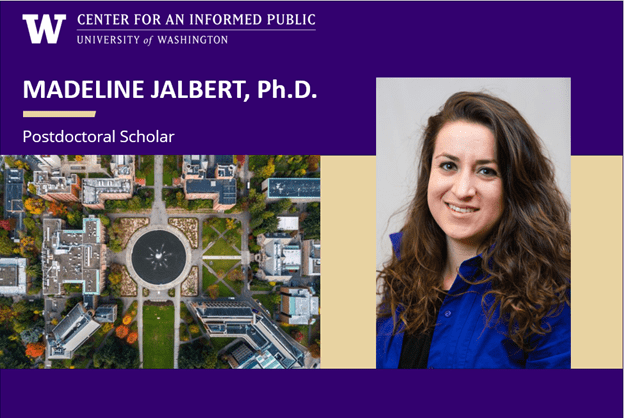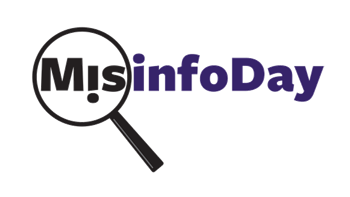This is a web version of the Center for an Informed Public‘s News & Insights newsletter for August 2021, which was sent out on August 31. Check out our newsletter archives. Not signed up to receive the CIP’s newsletter? Sign up here.
$2.25 million in National Science Foundation funding to support CIP’s rapid-response research of mis- and disinformation
The National Science Foundation (NSF) has awarded a $3 million collaborative grant to a team led by the University of Washington‘s Center for an Informed Public and supported by Stanford University to study ways to apply collaborative, rapid-response research to mitigate online disinformation. This project, funded through the NSF’s Secure and Trustworthy Cyberspace program, will start in October and be led by UW Human Centered Design & Engineering associate professor Kate Starbird and UW Information School associate professors Emma S. Spiro and Jevin D. West, who in 2019 helped launch the CIP, a multidisciplinary research center with a mission to study mis- and disinformation, promote an informed society and support democratic discourse. Of the $3 million awarded to the UW-Stanford research collaboration, the UW team at the CIP will receive $2.25 million.
CIP welcomes social and cognitive psychology researcher Madeline Jalbert as postdoctoral scholar.
Planning is underway for MisinfoDay 2022, series of monthly lessons
The University of Washington‘s Center for an Informed Public, through its statewide partnership with Washington State University‘s Edward R. Murrow College of Communication, is currently planning for the next MisinfoDay, to be held in March 2022.
- Attention teachers, librarians and other educators: In September, we’ll be rolling out the first in a series of “MisinfoDay Monthly” video lessons for high school students focused on key ideas and concepts around information literacy skills and the dynamics of mis- and disinformation, with insights from experts at UW and WSU. Sign up to receive our monthly lessons and MisinfoDay 2022 planning updates.
- Do you work at a college or university that may be interested in hosting a local MisinfoDay event? Check out our online guide: “How to Host Your Own MisinfoDay: A Guide for Colleges and Universities“
RESEARCH NOTES
IMLS awards $250,000 grant to test a misinformation-focused escape room game, co-design camps in libraries
The Institute of Museum and Library Services (IMLS) has awarded a nearly $250,000 grant to a project that will develop and implement a comprehensive program for libraries that aims to foster greater understanding and resilience to misinformation. The project — led by Center for an Informed Public cofounder Chris Coward, a UW Information School senior principal research scientist who directs the Technology & Social Change Group, and CIP faculty member Jin Ha Lee, an iSchool associate professor who directs the Game Research Group — seeks to build and deploy an online escape room hosted by librarians that will help libraries’ capacity to address misinformation through innovative educational programming.
***
- The UNC Chapel Hill Center for Information, Technology, and Public Life (CITAP) has named CIP postdoctoral researchers Kolina Koltai and Rachel E. Moran and UW iSchool Ph.D. student Sarah Nguyễn as part of CITAP’s 2021-2022 cohort of faculty, postdoctoral, and graduate student affiliates.
- Moran, who is also a fellow at The George Washington University Institute for Data, Democracy & Politics (IDDP), was recently featured in a GW Today Q&A, where she discussed research exploring trust in digital information environments and her ongoing work, with Nguyễn, to study how misinformation about the 2020 U.S. elections spread within Vietnamese diasporic communities, work that is supported with IDDP funding. Read more about their early findings.
INSIGHTS
The ways anti-vaccine activists and others try to avoid content moderation on social media platforms
In a recent episode of Community Signal, a podcast for professionals who manage online communities, CIP postdoctoral researcher Rachel E. Moran and undergraduate research assistant Joey Schafer discussed their work with the Virality Project, a COVID-19 vaccine misinformation research consortium, and their insights into the ways anti-vaccine activists and others use to avoid content moderation, including emerging folk theories “that define how some believe how social platforms and algorithms work to moderate their content and conversations.”
- Listen to the Community Signal podcast episode | “Here’s How Anti-Vaxxers Are Spreading Misinformation Despite Your Best Moderation Efforts“
- Virality Project | “Content Moderation Avoidance Strategies“
CIP IN THE NEWS
‘The idea of doctors fighting the system is a narrative that is really appealing to a lot of people’
Time magazine recently interviewed CIP postdoctoral researcher Kolina Koltai for an article about America’s Frontline Doctors, a group that has promoted ivermectin, a medication normally used to treat livestock with parasitic worms, as a treatment for people with COVID-19. Koltai, who studies anti-vaccine misinformation, said that the group has had “the perfect storm of everything that you needed to have a large population of people susceptible to vaccine misinformation. … This idea of doctors fighting the system is a narrative that’s appealing to a lot of people.”
In The New York Times, CIP postdoctoral researcher Rachel E. Moran was interviewed about the challenges posed by medical doctors who spread vaccine misinformation by using their titles and expertise to make their arguments and assertions more authoritative. “What’s most frustrating about this is how anti-vaccination advocates typically spread mistrust in medical professionals until it’s no longer a useful strategy for them,” Moran told The Times. “Then a ‘doctor’ comes along who aligns with their values and suddenly that institutional expertise is credible.”
- Read more in The New York Times | “Calls Grow to Discipline Doctors Spreading Virus Misinformation“
***
- Brier Dudley, a columnist for The Seattle Times, interviewed CIP postdoctoral researcher Rachel E. Moran to expand upon comments she made in The New York Times about “local” news sites that spread vaccine misinformation. “On the one hand, we need proper definition around who gets to credibly be called a local outlet,” Moran told Dudley. “On the other hand, there are these news sites that look like a news site and read like a news site … unfortunately, people are reading them as local news.” [The Seattle Times; The New York Times]
- In a separate article in The New York Times, Moran shared insights regarding how although misinformation about the COVID-19 delta variant will lose some attention over time, don’t expect it to go away anytime soon. “Unfortunately, it’s not spikes and troughs, but steady levels of misinformation.” [The New York Times]
- Moran was also interviewed by Input magazine and the Sydney Morning Herald in articles about vaccine misinformation spreading via LinkTree’s “link in bio” feature. [Input; Sydney Morning Herald]
- GeekWire recently featured news about the National Science Foundation awarding a team led by CIP co-founders Kate Starbird, Emma S. Spiro and Jevin D. West $2.25 million in funding to support the center’s mis- and disinformation rapid-response research. GeekWire also interviewed CIP postdoctoral researcher Joe Bak-Coleman, the first author on a recently released paper in the Proceedings of the National Academy of Sciences, “Stewardship of global collective behavior,” which calls for the study of collective behavior and communications technology to rise to a “crisis discipline,” like climate science. [GeekWire; PNAS]
- West, a UW Information School associate professor, was featured in an “Access Utah” interview on Utah Public Radio, where he discussed Calling Bullshit: The Art of Skepticism in a Data-Driven World, a 2020 book he co-authored with CIP faculty member Carl T. Bergstrom, a UW Department of Biology professor. [Utah Public Radio]
- Bergstrom also recently spoke with CNN for a feature story how to encourage friends and loved ones to stop spreading misinformation on social media. [CNN]






